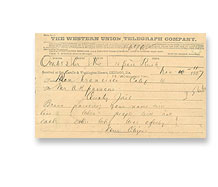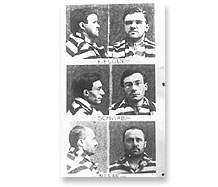"Haymarket Affair" is a convenient term of reference for a controversial series of events that occurred in Chicago during the years 1886 and 1887. Some of the events and the circumstances surrounding them are disputed or not fully understood. The identity of the bomber has never been established for certain. The events that are generally agreed to belong to the narrative of Haymarket are:
May 3, 1886 -- McCormick Reaper Works factory strike; unarmed strikers, police clash; several strikers are killed.
Evening of May 4, 1886 -- A meeting of workingmen is held near Haymarket Square; police arrive to disperse the peaceful assembly; a bomb is thrown into the ranks of the police; the police open fire; workingmen evidently return fire; police and an unknown number of workingmen killed; the bomb thrower is unidentified.
May 5- 6, 1886 -- Widespread public outrage and shock in Chicago and nationwide; police arrest anarchist and labor activists, including seven of the eight eventual defendants (Albert Parsons fled the city only to surrender himself on June 21.).
May 27 -- The grand jury indicts 31, charged with being accessories to the murder of policeman Mathias J. Degan; eight are chosen to stand trial: Albert Parsons, August Spies, Oscar Neebe, Louis Lingg, George Engel, Adolph Fischer, Michael Schwab, Samuel Fielden.
June 21, 1886 - July 15, 1886 -- Jury selection commences; 981 citizens are questioned during the voir dire process; the resultant panel of twelve are largely businessmen, clerks or salesmen; the jurors, like the public at large, hold preconceived notions about the defendants' connection to the bombing.
July 16, 1886 - August 11, 1886 -- Trial testimony begins; 227 testify including 54 members of the Chicago Police Department and the defendants Fielden, Schwab, Spies and Parsons; the defendants are prosecuted not as perpetrators but as responsible for instigating the violence; a guilty verdict and death sentence are considered inevitable. |
  Telegram to Parsons (top), Mugshots (bottom). | ||
For an in-depth analysis of the history of the Haymarket Affair, please visit The Dramas of Haymarket, an affiliated, interpretive web site developed by Northwestern University in cooperation with the Chicago Historical Society.
| |||
| |||
